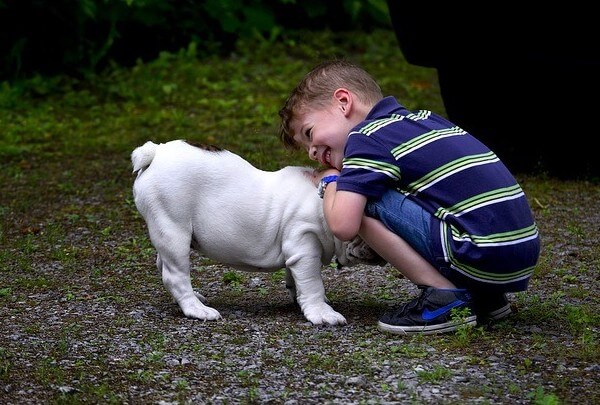
I visited a Bulldog breeder yesterday and noticed all the Bulldog puppies had very tiny tails that almost look like they had no tails at all. This breeder had different color French Bulldogs including Pied French Bulldogs. She took the time out of her day to explain to me all about Bulldog tails. You’re here because you’re also wondering the same thing.
Do Bulldogs have tails? Yes, bulldogs have tails. But they can be a bit hard to spot at times. Bulldog tails are usually small and curled, but you’d also see some Bulldogs sporting a noticeably long tail.
The Bulldog is a term we use to refer to the English Bulldog. There’s also the American Bulldog, the French Bulldog, and the olde English Bulldog. All these Bulldogs have distinct tails in terms of shape and size. Some have a straight and long tail, whereas some have a curly or short and stumpy tail.
Table of Contents
Are Bulldogs born with tails?

For someone used to the lack of a tail on a Bulldog, a Bulldog with a tail would look like an oddity. That’s because most Bulldogs we see are born with a tiny tail that sticks close to their behinds, making it hard to notice.
However, you will rarely come across a Bulldog with full tail. A Bulldog full tail is what you’d call the typical long tail that most other dogs have, bringing us to the next question.
Do Bulldogs have long tails?
Yes, some Bulldogs do have long tails. You’d find it rarely among English Bulldogs and never among French Bulldogs. However, American Bulldogs and Olde English Bulldogs have naturally long tails.
In English and French Bulldogs, a long tail is very rare. It’s not a breed standard according to the American Kennel Club, meaning a Bulldog with long tail wouldn’t qualify for dog shows. However, dog experts believe a long tail is healthy for a Bulldog and don’t consider it a defect.
Are Bulldogs born with long tails?
The kind of tail on a Bulldog depends on its breed and heritage. What we call “Bulldogs” are actually English Bulldogs, and they’re typically born with a very short tail. The same goes for French Bulldogs or Frenchies. If your English or French Bulldog puppy tail is long, it shows a mixed parentage. The American Kennel Club considers short and corkscrew tails as the standard for Bulldogs.
Other species of Bulldogs, such as the American Bulldog and Olde English Bulldog, typically exhibit a long tail. For them, such a tail is the breed standard.
You’re probably wondering why most Bulldogs have short tails. Luckily for you, we will cover that next.
Why do Bulldogs have short tails?
Bulldogs come from a lineage of strong, hardworking dogs. In their early days, Bulldog owners cropped their tails to prevent rabies and infections, improve back strength, and prevent injuries during combat.
Bulldogs with naturally smaller tails were preferred and selectively bred, which is why today, most Bulldogs have a tiny tail. This trait extends to other Bulldog species. Take the French Bulldog, for instance.
Are French Bulldogs born with tails?

Yes, French Bulldogs are born with tails, however, a French Bulldog puppy tail is so small, it’s almost nonexistent.
French Bulldogs is another Bulldog breed that many consider tailless since they lack a sizeable tail. It will make you question, “Are French Bulldogs born with a tail?” but Frenchies are born with tails like all other Bulldogs.
French Bulldog puppies’ tails grow a bit as they get older. Still, they don’t get much bigger than a stump.
Do Frenchies have tails?
Now that you know that some Bulldog varieties naturally have full tails, you’re probably wondering, “Do French Bulldogs have long tails?”
Frenchies come in few different tails shapes; however, none grow any longer than a couple of inches. French Bulldog undocked tails can be straight, screw-shaped, or tapered.
As per kennel club requirements, screw-shaped tails must not curl too much, and the tapered tail must not stand upright. The French Bulldog straight tail must extend straight down and be long enough to cover their rear end to fulfill breed standards.
Kennel clubs prefer small tails on Frenchies. However, you may wonder what kind of tail these dogs are born with. Are Frenchies born with short tails or are they born with long tails? Let’s find out!
Are French Bulldogs born with short tails?
Yes, purebred French Bulldogs are born with short tails. Breeders of this adorable dog have selectively bred short-tailed varieties to go with their overall cute appearance. But can Frenchies come with long tails?
Are French Bulldog born with long tail?
Have you ever seen a French Bulldog with long tail? We haven’t either. French Bulldogs usually have tailless behind that suits their petite bodies. Some people believe that French Bulldogs are born with long tails that are docked for cosmetic reasons. Allow us to clear that up.
Are French Bulldogs’ tails docked?
If you’re worried thinking, “Do French Bulldogs have docked tails?” you’d be glad to know that they don’t. Thanks to selective breeding, Frenchies are no longer born with tails that need docking. Their tails are naturally short and come in three shapes.
French Bulldog tail types
There are three types of French Bulldog tails. No matter the type, none of these tails grow bigger or longer than an inch or two. A French Bulldog with a tail type that is different from these would be a sign of crossbreeding. The three types are:
1. Tapered tail
The tapered tail is thick at the root and thin at the tip, making a V-shape. According to breed standards, it should just be long enough to cover the dog’s anus.
2. Screwed tail
The screwed tail got its name because it resembles a screw. Note that it’s not the same as a curled tail, meaning it extends downwards and not around itself.
3. Straight tail
The straight tail extends straight down but is still short and stumpy. As with a tapered tail, it should also be big enough to cover the dog’s rear behind.
Do English Bulldogs have tails?
Now that we know quite a bit about the French Bulldog, let’s move on to the English Bulldog. Do English Bulldogs have long tails? Or do they have short tails? Do they even have tails at all?
The answer to all these questions is yes; English Bulldogs have tails, and they can be short or long. These tails grow more pronounced with age. But what about when they’re newly born?
Are English Bulldogs born with tails?
Due to their tails being so hard to notice, many people wonder, “Are English Bulldogs born without tails?” The answer is no; all Bulldogs are born with tails. English Bulldog puppies’ tails are usually small and difficult to detect, but English Bulldog tails can also be long.
Unfortunately, a long English Bulldog tail isn’t as well-liked as a curly or short tail due to the AKC considering them a breed defect. We discuss it further below.
Are English Bulldogs born with long tails?
Yes, some English Bulldogs are born with long tails. Although such tails are perfectly healthy in every way, kennel clubs and Bulldog purists frown upon long tails in English Bulldogs.
Unfortunately, this also encourages cosmetic docking. However, that doesn’t mean that all Bulldogs have docked tails—some have naturally short tails.
Are English Bulldogs born with short tails?
Yes, most English Bulldogs are born with short tails that are barely noticeable when they’re young. The shape (straight or corkscrew) of the tail is evident from a young age. Short tails usually don’t need docking unless medically required.
We’ve mentioned docking a bunch of times already, so what exactly is tail docking? Let’s find out.
What is tail docking?
Docking or cropping refers to chopping off a dog’s tail partially or completely. A few centuries ago, English Bulldog tail docking was done to protect them from injuries.
However, today breeders could produce Bulldogs with naturally short tails through selective breeding, and docking English Bulldog tails was no longer necessary. These days, tail docking is mainly done for medical reasons.
Why would you dock a dog’s tail?
Back in the day, dog owners thought tail docking prevented rabies. They also docked tails to strengthen dogs’ backs and to prevent injuries. Hunting dogs also had their tails cropped to avoid catching infections while running through vegetation.
Today, many countries have banned docking. Only if your dog has a tail infection or disease would a vet consider docking its tail. Tail docking just for looks is a controversial practice banned in many countries.
Unfortunately, cosmetic docking hasn’t completely gone away due to the AKC’s preference for short tails on Bulldogs, and the docking laws being almost nonexistent in the US.
You may be interested in: Why Does My Dog Walk In Circles Around Me?
Are English Bulldog tails docked or cropped?
While a purebred English Bulldog has a naturally short tail, there are instances when docking or cropping becomes a necessity. Infections, bone deformity, spinal issues, and ingrown tails are some medical conditions that warrant a tail amputation.
English Bulldog tail types
The English Bulldog comes in three tail varieties. While all three are natural tail shapes for these dogs, Kennel clubs have differing preferences for each. Let’s go over each one.
1. English Bulldog with long tail
The long and sometimes wavy tail was an original Bulldog feature that has become extremely rare due to selective breeding. AKC considers long tails on English Bulldogs faulty. But if you’re not planning on entering dog shows, your long-tailed Bulldog is just as healthy and loving as other Bulldogs.
2. English bulldog corkscrew tail
The corkscrew tail is the most preferred type in English Bulldogs; plus, the AKC considers this shape the breed standard. Due to these reasons, this shape is the most sought-after tail for breeders. Unfortunately, this tail is also most prone to health complications.
3. English Bulldog straight tail
Due to its demand by the AKC, the straight tail is also very popular. Unlike corkscrew tails, the straight tail is much less prone to infections and diseases. The tail is broad at the base and tapers towards the tip. It may extend downwards or straight backward like a pump handle.
Are English Bulldogs’ tails cut off at all?
Sometimes, yes, the English Bulldogs’ tails may be cut off. There are medical issues that may require partial or complete removal of an English Bulldog’s tail. While some owners may cut off a dog’s tail for aesthetic reasons, this act is illegal in many countries.
Does it hurt a dog to have its tail cut off?
Yes, it hurts when a dog’s tail is cut off. Keep in mind that the tail is a part of the dog’s spine, and chopping it off will cause a lot of pain. If cutting the tail is unavoidable, a vet may perform surgical tail amputation using anesthetics. That’s a safe and painless way to remove a dog’s tail.
UK and US tail docking law
In the UK, tail docking is only allowed if a qualified veterinarian deems it necessary for the dog’s health. You can’t dock a dog’s tail in the UK for cosmetic reasons.
The USA, on the other hand, has no such prohibitions. While some states have considered presenting bills to outlaw cosmetic docking, there are no restrictions currently in place. Luckily, better awareness of animal rights has made people less inclined to hurt their dogs by chopping off their tails.
English Bulldog tail problems
- Hygiene issues: English Bulldog tails are often tougher to keep clean.
- Infections: Poor hygiene can lead to several skin infections. Yeast infection and tail pocket infection are common among Bulldogs. Some of these require tail docking.
- Ingrown tail: it’s a tail that grows inwards and needs veterinary treatment.
- Hemivertebrae: a congenital condition that is more prevalent in corkscrew tails and causes spinal problems.
Handy Hint: Dog Grooming is an essential part of having dogs. If you’re a first-time dog owner or want to read more about dog grooming, check out Dog Grooming For Beginners At Home: Dos and Don’ts
What is a tail pocket on an English Bulldog?
English Bulldogs have very wrinkly skins with lots of folds. An English Bulldog tail pocket is an area of folded skin that develops under their tails and collects dirt, moisture, and germs.
Not all Bulldogs have tail pockets, but they’re prone to developing one. This folded skin is difficult to clean and can get infected if you don’t take care of it or clean it routinely.
Are olde English Bulldogs born with tails?
Yes, olde English bulldogs are always born with a tail. The Olde English Bulldog tail is usually much longer than its modern counterpart: the English Bulldog.
Back in the day, Bulldogs had a full tail that reached the middle of their legs. Over time, selective breeding changed the Bulldog’s original body design, resulting in their modern-day version completely replacing the olde English Bulldog version.
A few decades ago, the Olde English Bulldog returned from extinction, complete with the original appearance and full tail. Today, they’re recognized by the United Kennel Club of Britain.
Although UKC prefers intact, full tails, old English Bulldog tail docking is acceptable as long as there’s a valid medical reason.
So, do Bulldogs have tails?
As you can see, Bulldogs do have tails. But due to their tiny size, Bulldogs are sometimes categorized as tailless dogs. Some Bulldog breeds have naturally long tails, whereas some are preferred to have little tails. Nevertheless, tails play an essential role in helping the dog express its feeling and convey messages to others.
Related Questions
Bulldog tails are partially or completely cut off due to medical reasons. They’re also cut for ornamental purposes because some people prefer tiny tails on Bulldogs.
No, some Bulldogs naturally have a tiny tail, which may lead you to think it’s been docked. In truth, the small tail on a Bulldog is perfectly natural.
French Bulldogs, English Bulldogs, corgis, Schipperkes, Australian Stumpy-tail cattle dogs, Boston terriers, and Croatian sheepdogs are all born with a tiny tail and are considered tailless dogs.
DISCLAIMER: THIS WEBSITE DOES NOT PROVIDE MEDICAL ADVICE
The information, including but not limited to, text, graphics, images and other material contained on this website are for informational purposes only. No material on this site is intended to be a substitute for professional veterinary advice, diagnosis, or treatment. Always seek the advice of your veterinarian or other qualified health care provider with any questions you may have regarding a medical condition.
Resources:
https://en.wikipedia.org/wiki/Bulldog
https://www.akc.org/dog-breeds/bulldog/

With over five years of specialized experience as an animal writer, my expertise lies in dog nutrition, health, behavior, grooming, and training. I am dedicated to delivering helpful and informative content that caters to the well-being of our furry friends. My primary goal is to empower pet owners with knowledge and ensure our canine companions thrive in health and happiness. In my free time, I love volunteering at local dog rescue centers.







